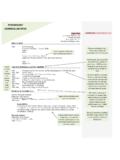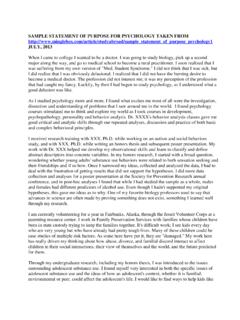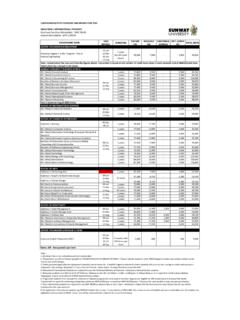Transcription of Kisses of Death in the Graduate School Application Process
1 Kisses of Death in the Graduate School Application ProcessDrew C. ApplebyKaren M. ApplebyIndiana University Purdue University IndianapolisIdaho State UniversityA survey of psychology Graduate admissions committee chairs re-vealed 5 categories of mistakes applicants make that diminish theirprobability of acceptance. We discuss 3 strategies that psychologydepartments can use to decrease the likelihood that students willcommit these mistakes in their Graduate School applications andprovide suggestions that will help students avoid these ideal student, seen through the eyes of Graduate faculty, isgifted and creative, very bright and extremely motivated tolearn, perfectly suited to the program, eager to actively pursuethe lines of inquiry valued by the faculty, pleasant, responsi-ble, and devoid of serious personal problems.
2 Keith-Spiegel & Wiederman (2000, p. 32)This statement indicates that applicants must conveythese impressions to Graduate School admissions committeesthroughout the Application Process to gain acceptance intograduate programs. Numerous authors have offered advice toundergraduate psychology majors about gaining admission tograduate programs during the past decade (Appleby, 2003a;Buskist & Sherburne, 1996; Keith-Spiegel & Wiederman,2000; Kinder & Walfish, 2001; Kuther, 2003, 2004;Landrum & Davis, 2003; Lloyd, 2001;Morgan & Korschgen,2005; Peterson s, 2001; Sayette, Mayne, & Norcross, 2004;Taylor-Cooke & Appleby, 2002).
3 Despite this wealth of valu-able information, few authors advise students about whatthey shouldnotdo when applying to Graduate School . Whenauthors do offer this advice, few support it with surveyed chairs of Graduate School admissions com-mittees in psychology about the characteristics of graduateschool candidates that decrease their chances for acceptance( , Kisses of Death [KODs]). Our data provide faculty whomentor, advise, and teach psychology majors with strategiesto enable their students to avoid KODs when they apply tograduate mailed a letter addressed to the Chair of the GraduateAdmissions Committee to each of the 457 psychology gradu-ate programs listed in the American Psychological Associa-tion s (2001) Graduate Study in Psychology letterexplained the purpose of the study and asked participants toprovide one or two examples of Kisses of Death you have en-countered during your career.
4 We defined KODs in the letteras aberrant types of information that cause Graduate admis-sions committees to reject otherwise strong applicants. Data AnalysisEighty-eight of the 457 chairs (19%) returned their sur-veys, and these responses yielded 156 examples of relatively low response rate is common in qualitative re-search that uses open-ended questions because, although thistype of question gives respondents freedom to expand onideas, it often requires more time to answer than closedquestions (Thomas & Nelson, 2001, p. 263). We qualita-tively analyzed the 156 examples of KODs according to thefollowing procedures (Miles & Huberman, 1994; Patton,1990).
5 First, we independently inductively analyzed each ex-ample (McCracken, 1988). This approach required us toconsider each response individually and to identify its centraltheme (poorly written Application , harmful letter of recom-mendation, or lack of interest in research). Second, we inde-pendently grouped these inductive findings into categories,or words, phrases, sentences, or whole paragraphs, con-nected .. to a specific setting (Miles & Huberman, 1994, ), that described broad situations in which several similarKODs occurred ( , we placed an example identified as aninappropriate letter of recommendation author under themajor heading for harmful letters of recommendation).
6 Third, we conducted analyst triangulation (Patton, 1990,p. 468) by comparing our findings from Step 1 and our cate-gories from Step 2. This procedure yielded a set of themesthat were both internally consistent ( , all categories con-tained numerous similar responses) and externally represen-tative of broad examples of KODs (Patton, 1990).ResultsWe identified the following five major KOD categories:(a) damaging personal statements, (b) harmful letters of rec-ommendation, (c) lack of program information, (d) poorwriting skills, and (e) misfired attempts to impress. We subse-quently describe these categories in descending order of fre-quency accompanied by illuminating Personal StatementsThe personal statement section of a Graduate School appli-cation is an opportunity to inform an admissions committeeabout personal and professional development, academicbackground and objectives, research and field experiences,and career goals and plans (Keith-Spiegel & Wiederman,2000).
7 We found 53 responses related to damaging personalVol. 33, No. 1, 200619statements, which we sorted into four subcategories: personalmental health, excessive altruism, excessive self-disclosure,and professional mental discussion of a personalmental health problem is likely to decrease an applicant schances of acceptance into a program. Examples of this par-ticular KOD in a personal statement included comments suchas showing evidence of untreated mental illness, emotionalinstability, and seeking Graduate training to better under-stand one s own problems or problems in one s family.
8 Morespecifically, one respondent stated that a KOD may occur when students highlight how they were drawn to graduatestudy because of significant personal problems or School is an academic/career path, not a personaltreatment or intervention for problems. Excessive respondents described per-sonal statements that expressed excessively altruistic profes-sional goals as KODs. Admissions committees are not im-pressed by statements such as I want to help all people, I mdestined to save the world, or I think I am a strong candidatefor your program because people have always come to me withtheir problems; I am viewed as a warm, empathetic, and caringperson.
9 One respondent offered the following advice: Ev-erybody wants to help people. That s assumed. Don t say thereason you want to go into clinical psychology is to help peo-ple. Thus, a personal statement should focus on the student sprofessional activities such as research interests and pursuits,academic strengths, and professional experiences rather thanon purely personal characteristics and motives. It is better toallow letter of recommendation authors to describe strongpersonal qualities than to include them as self-perceptions ina personal another KOD in personal statements. An ex-ample of such disclosure was a long saga about how the stu-dent had finished [ School ] over incredible odds.
10 Much betterto have a reference allude to this. However, one committeechair noted that Graduate admissions committees do not al-ways view this type of information negatively if an applicanthas written it in a professional manner that is appropriate forthe context of a formal applicant mentions in the personal statement that he/she decided to pursue a career in clinical psychology due topersonal family experience with psychopathology. This isn talways a kiss of Death , but a sensitive area such as this shouldbe communicated carefully. If the applicant is spilling overly personal information in a written statement, I oftenview this as a worry sign or an indication of poor interper-sonal final example of a KODthat can occur in a personal statement is any professionally in-appropriate information that does not match the context ofthe Application .




